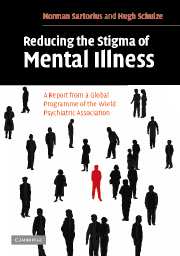Book contents
- Frontmatter
- Contents
- Preface
- Introduction
- Structure of this Book
- Participants in the Programme
- Acknowledgements
- 1 Developing the Programme
- Phase I Calgary, Alberta, Canada
- Phase II
- Phase III
- 5 Germany
- 6 Italy
- 7 Greece
- 8 United States
- 9 Poland
- 10 Japan
- Phase IV
- Afterword
- Appendix I
- Appendix II
- Appendix III
- Appendix IV
- Index
5 - Germany
from Phase III
Published online by Cambridge University Press: 15 August 2009
- Frontmatter
- Contents
- Preface
- Introduction
- Structure of this Book
- Participants in the Programme
- Acknowledgements
- 1 Developing the Programme
- Phase I Calgary, Alberta, Canada
- Phase II
- Phase III
- 5 Germany
- 6 Italy
- 7 Greece
- 8 United States
- 9 Poland
- 10 Japan
- Phase IV
- Afterword
- Appendix I
- Appendix II
- Appendix III
- Appendix IV
- Index
Summary
In 2002, the movie, A Beautiful Mind, John Nash won the Academy Award for the Best Film and Ron Howard won for the Best Director. The movie followed the life of mathematician John Nash from his days as an undergraduate at Princeton when he first developed symptoms of schizophrenia to his Nobel speech in Stockholm.
When the film was released in Germany, another film was receiving a great deal of attention though its international distribution would be far more limited. Das Weiße Rauschen (The White Noise) is the story of a Lukas, a 21-year-old college student who develops schizophrenia. The film won the Max Ophüls Newcomer Prize at the Saarbrücken Film Festival. When word spread of the film at the Berlin Film Festival, the single screening – put on for distributors and the press – was standing room only. Exhibitors had to set up a second screening to accommodate those who could not attend the first screening.
Despite the similar subjects of the films – two first-person perspectives on the thoughts, delusions and hallucinations of a person living with schizophrenia – the presentations were dramatically different. A Beautiful Mind ends with the central character receiving the Nobel Prize, while Das Weiße Rauschen ends more enigmatically with the protagonist standing alone a beach, listening to the roar of the ocean.
- Type
- Chapter
- Information
- Reducing the Stigma of Mental IllnessA Report from a Global Association, pp. 49 - 61Publisher: Cambridge University PressPrint publication year: 2005

